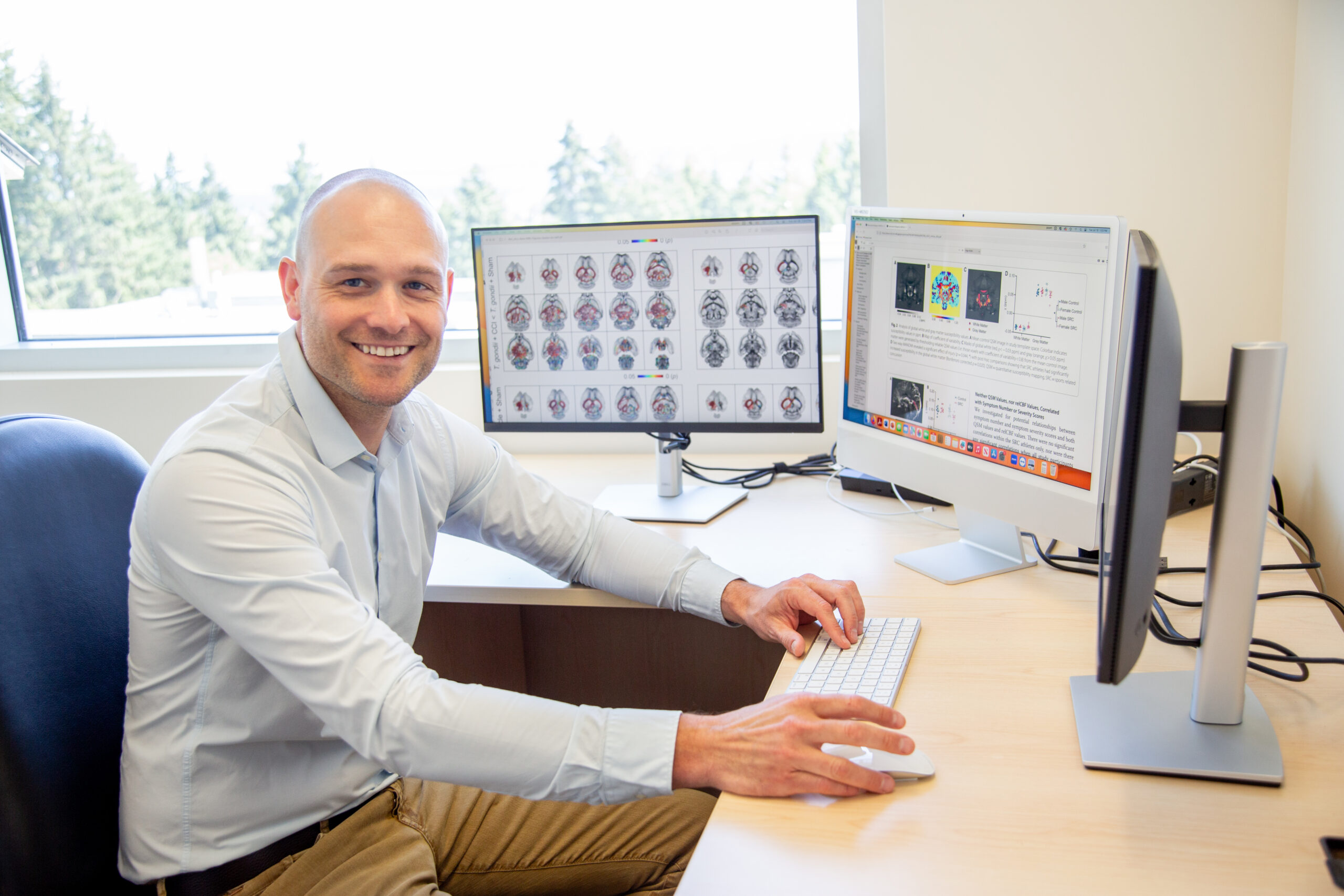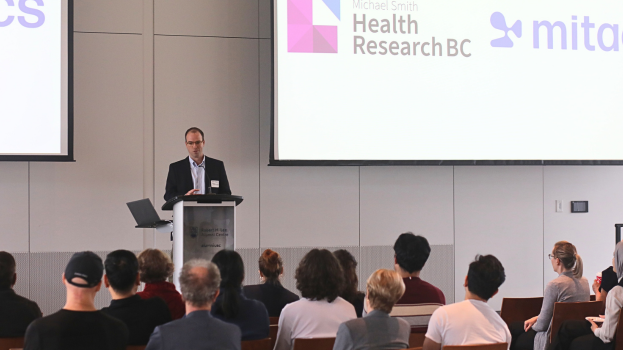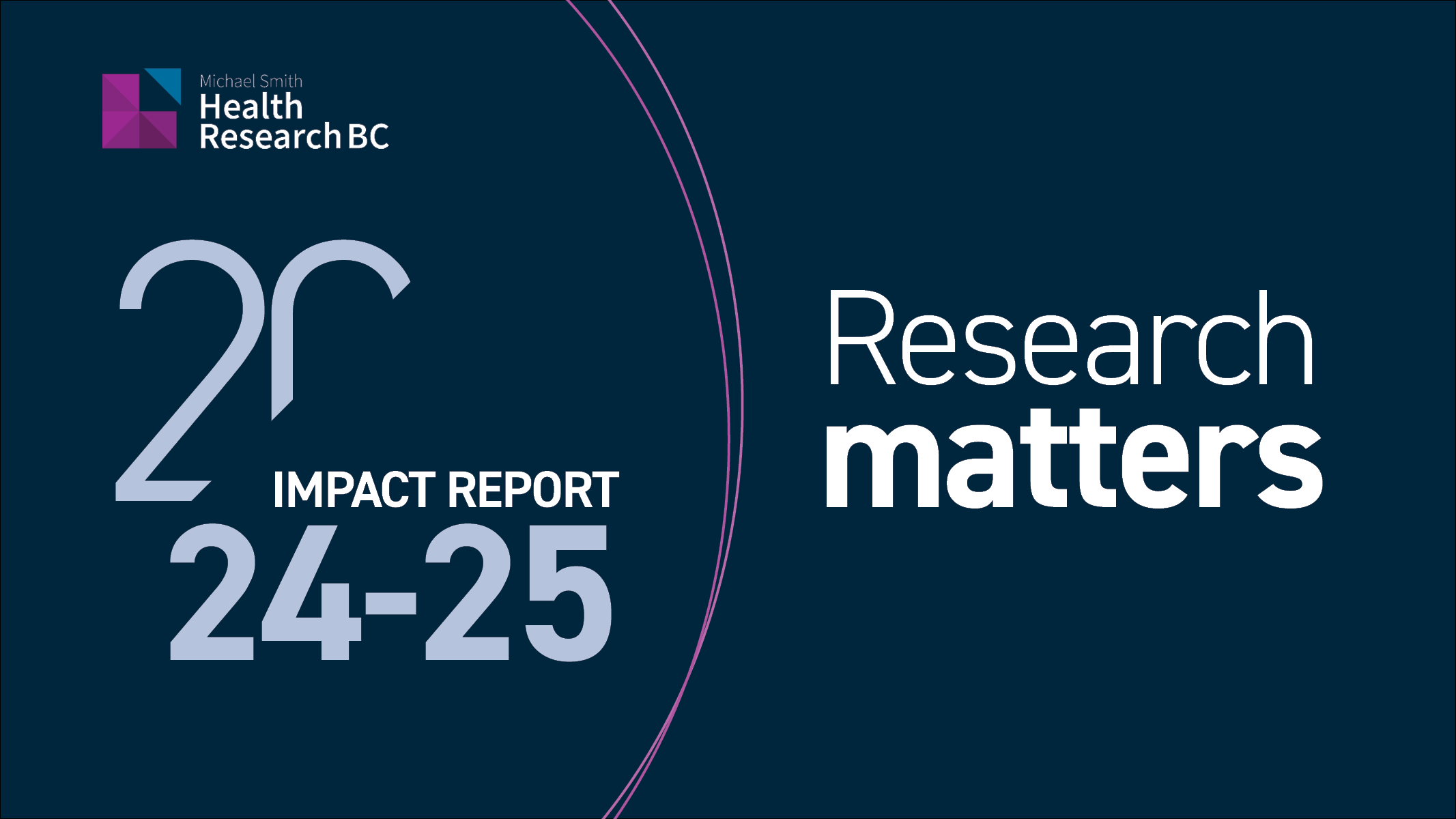Survivors shape research on brain injury after intimate partner violence
15 June 2023

Photo: Sandy Shultz reviews lab results. Photo credit: Vancouver Island University
Trigger warning: This story discusses intimate partner violence
“My lightbulb moment happened when I was listening to an audiobook that touched on domestic violence,” says Dr. Sandy Shultz, professor in the Department of Nursing, Health and Human Services at Vancouver Island University. “My work focused on brain injuries in athletes, and there’s been improvements in how we diagnose and treat these injuries. But people experiencing intimate partner violence haven’t benefitted from this new knowledge.”
In Canada, over 40 percent of women have experienced harm at the hands of their partner – that’s 20,000 women in BC each year. The rates are even higher for Indigenous women, 2SLGBTQIA+ people, and women living with disabilities. Intimate partner violence includes physical, sexual and emotional harm. It affects people of all genders, ages, and backgrounds. However, the vast majority of people experiencing this type of violence are women, and this violence is most often perpetuated by men.
“Intimate partner violence carries a stigma,” says Sandy. “It’s not reported or discussed openly. People have the sense that it’s not happening in their communities, but it’s prevalent everywhere, in all walks of life.”
Evidence shows that up to 90 percent of people surviving intimate partner violence experience a brain injury. Injuries can range from a concussion to a severe head injury and are associated with high rates of post-traumatic stress, anxiety and depression and other symptoms that can last for months to years. Long-term effects may also include cognitive disability and dementia.
“When people seek care after experiencing intimate partner violence, they are rarely screened for brain injuries,” says Sandy. “There is no current standard of screening, and even if they are screened the brain injury symptoms can be misidentified as emotional distress. This means these patients do not receive the care or support that other brain injured patients receive.”
In health care settings, evidence shows that there are no standard screening practices, and that care providers would benefit from training on brain injuries after intimate partner violence. After an acute event, any gap in care will make injuries worse – there may be limited knowledge of how to support people with brain injury, and a limited support network or safe housing to stay when survivors are discharged. This means women often have no choice but to go back to environment where they were harmed – with the perpetrator.
Sandy wants to change treatment for brain injury after intimate partner violence in BC. He believes that brain injuries resulting from intimate partner violence could be fundamentally different from the concussions that occur in sports. In intimate partner violence, concussions often occur together with strangulation. These brain injuries are repetitive, without recovery, and alongside extreme stress, which combined can have devastating outcomes. But little is known about brain injury in women and how their lived experience is affected by intimate partner violence, and if there are reliable biomarkers or interventions to improve detection or recovery.
Last fall, Sandy worked with the BC SUPPORT Unit Island Centre, Island Health’s forensic nursing team in Central Island, and people with lived and living experience and other community partners to discuss the needs of people experiencing intimate partner violence. They held a workshop where Sandy shared his expertise in biology, biomarkers and the treatment of brain injury. Using a learning health system approach, the group worked together to ensure Sandy’s research protocol could be implemented at Island Health and would help make more widespread impact.
“Attending the workshop was both an enjoyable and meaningful experience. It served as a reminder to me that there are many people dedicated to helping those with lived experience with intimate partner violence and acquired brain injury. I appreciated being able to contribute openly and honestly to the group conversations, and I especially appreciated observing the nurses exploring the use of the assessment tool and then participating in the follow-up conversation. That was the moment when I knew for sure that there are frontline service providers who really ‘get’ it. Thank you for giving me the opportunity to participate in this project as a patient partner.” – Patient Partner
The BC SUPPORT Unit, Island Centre, also helped Sandy build a patient advisory council by approaching patients in an appropriate manner, given the sensitive nature of the study. The advisory council shared their experiences and helped identify research priorities. They also provided first-hand consultation on the research protocol.
“Working with people with lived experience offers an entirely new perspective that’s incredibly important to my research,” says Sandy. “I’m very cautious when developing protocols, so we don’t retraumatize participants. But the patient advisory panel encouraged us to probe more deeply where they felt it was important to the research.”
The BC SUPPORT Unit, part of Health Research BC, is a provincial initiative that champions the participation of people with lived experience and communities in research and improves ways to put this research evidence into practice. The BC SUPPORT Unit, Island Centre connects care providers and decision-makers at Island Health with the region’s academic, patient and community partners. Sandy also received two awards from Health Research BC for his work on brain injury, including a 2022 Convening and Collaborating Award and a 2021 Scholar Award.
“I work with many patients that have experienced a brain injury from sexual or intimate partner violence, but so often these injuries go unreported and unrecognized,” said Aimee Falkenberg, Island Health’s clinical coordinator for the North and Central Island forensic nursing program. “I’m grateful to be working with Sandy and our patient partner team. Ultimately, this research will help survivors get the care they need, and support clinicians with better tools for diagnosis and treatment.”
Sandy’s research is still in its early phases. The team is recruiting participants and will complete sample and data studies in the coming years. Sandy’s hoping that the results will help change care for patients in the short term, such as demonstrating the need for a specialized clinic on Vancouver Island.
“Often, as scientists, we get wrapped up in the lab or behind the computer and begin to forget what we’re working toward,” says Sandy. “But connecting with patients helps bring us back to reality and gives the work meaning. We’re not just looking at biomarkers, we’re connecting to a real person.”
If you or someone you know are a victim of crime and need more information or support, call VictimLink BC at 1-800-563-0808 for toll-free, confidential, multilingual service available 24 hours a day, 7 days a week.
Call 9-1-1 or your local emergency number if you or someone you know is in immediate danger from assault or abuse.
REFERENCES
Government of BC. (2023). Gender-based violence, sexual assault, and domestic violence. Retrieved May 24, 2023 from https://www2.gov.bc.ca/gov/content/safety/public-safety/domestic-violence
Government of BC. (2023). What is violence against women. Retrieved May 24, 2023 from https://www2.gov.bc.ca/gov/content/safety/public-safety/domestic-violence/what-is-violence-against-women
Haag HL, Jones D, Joseph T, Colantonio A. Battered and Brain Injured: Traumatic Brain Injury Among Women Survivors of Intimate Partner Violence-A Scoping Review. Trauma Violence Abuse. 2022 Oct;23(4):1270-1287. doi: 10.1177/1524838019850623. Retrieved June 13, 2023 from https://pubmed.ncbi.nlm.nih.gov/31170896/
Healthlink BC. (2023). Traumatic brain injury. Retrieved May 18, 2023 from https://www.healthlinkbc.ca/health-topics/traumatic-brain-injury
Nanaimo Brain Injury Society. (2022). Workshop evidence synthesis and report.
Statistics Canada. (2021). Fact sheet: Intimate partner violence. Retrieved May 24, 2023 from https://women-gender-equality.canada.ca/en/gender-based-violence/intimate-partner-violence.html
St Ivany A, Schminkey D. Intimate Partner Violence and Traumatic Brain Injury: State of the Science and Next Steps. Fam Community Health. 2016 Apr-Jun;39(2):129-37. doi: 10.1097/FCH.0000000000000094. PMID: 26882416. Retrieved May 24, 2023 from https://pubmed.ncbi.nlm.nih.gov/26882416/
SOAR. (2022). At the intersection of intimate partner violence and brain injury: A call to action. Retrieved June 6, 2023 from https://soarproject.ca/wp-content/uploads/2022/06/IPV-AND-BI-A-CALL-TO-ACTION.pdf





